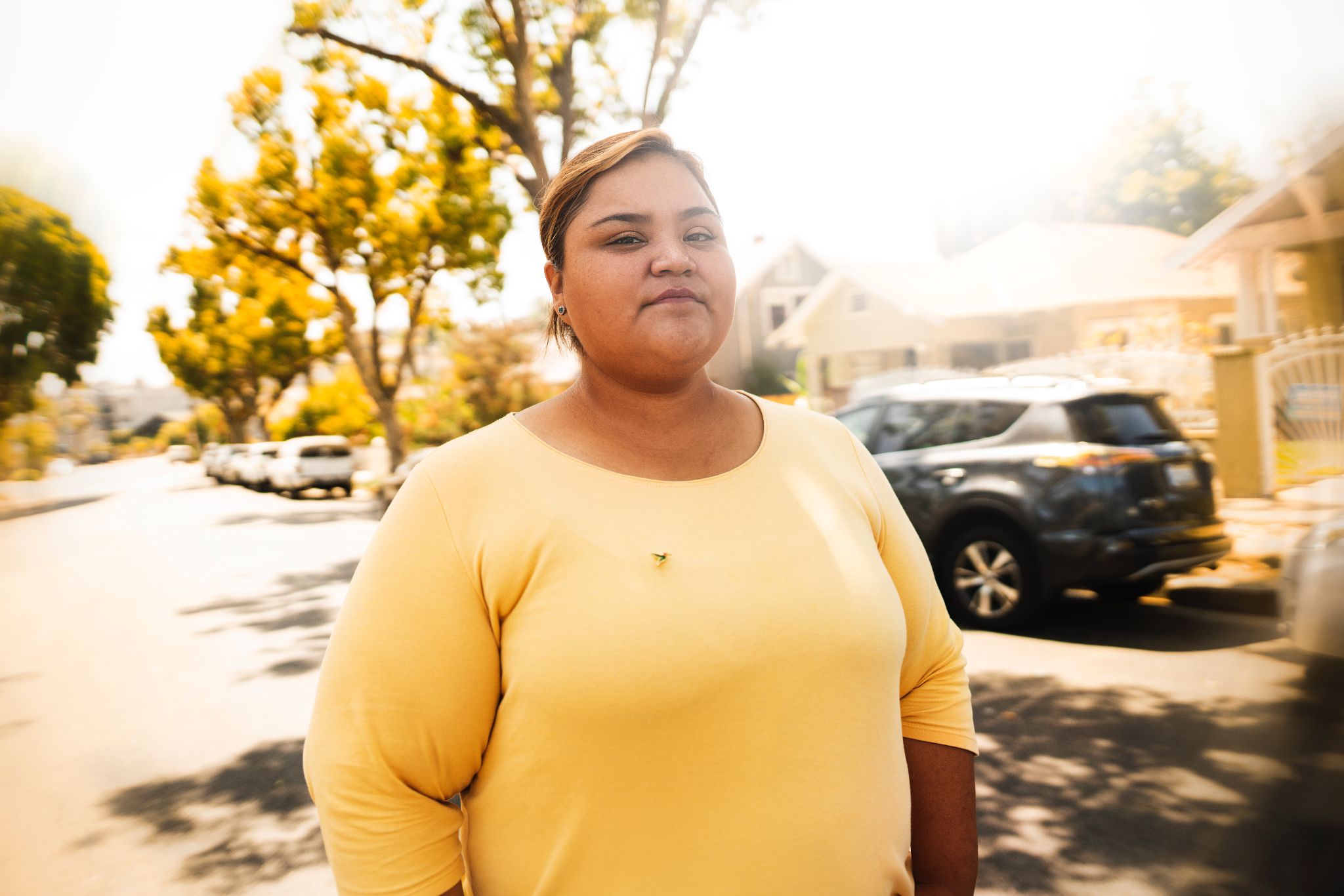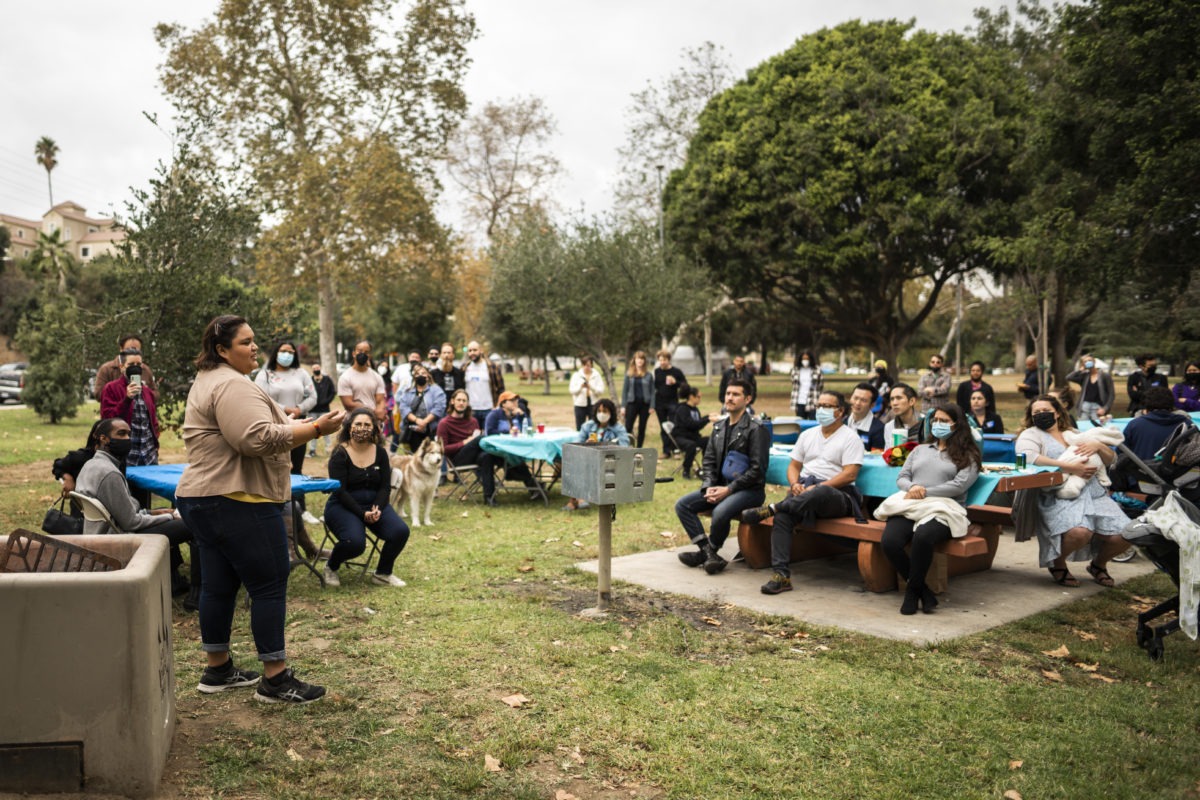A New Class of Candidates Seeks to Transform L.A.’s Approach to Housing, Justice
After a scandal engulfed some of L.A.’s most powerful politicians, a slate of progressive candidates is running on new approaches for tackling homelessness and mass incarceration.

In early October, a leaked audio recording captured members of the Los Angeles City Council making a series of racist remarks against Black and Indigenous communities. The impact of the resulting political firestorm will be revealed in today’s elections, when voters cast their ballots in races featuring a slate of reformers who could set a new course for the city on crucial issues like homelessness and mass incarceration.
The progressive candidates vying for council seats and other local offices show how criminal justice reform movements continue to fuel electoral campaigns, despite growing backlash.
Like many cities and counties, Los Angeles has teetered on the edge of criminal justice reform: cutting its police budget, then reinstating the funding; electing a reform-oriented district attorney, then trying to recall him, even after he walked back some of his bolder promises to address mass incarceration. Meanwhile, the Los Angeles County Sheriff’s department is under fire for harboring deputy gangs, the local jail is overcrowded, and the growing homeless population is criminalized.
The late Los Angeles historian Mike Davis wrote about how social movements come in waves. In a 2020 interview he talked about how the conditions that caused the 1992 riots remain, with the 2020 protests mirroring the uprisings of the past.
If the Los Angeles mayoral race were the only gauge of the future of criminal justice in the city, the status quo would likely remain intact. Both candidates in the nonpartisan race, Democratic Congresswoman Karen Bass and billionaire Rick Caruso (a former Republican with right-wing supporters), have doubled down on tough-on-crime and anti-homeless policies. Bass has promised to “aggressively recruit” new police officers, in line with a broader trend of Democrats backpedaling on criminal justice reform.
Elections further down the ballot point in a different direction, however. In the June primary, Eunisses Hernandez, co-founder of the prison abolitionist organization La Defensa, defeated Council District 1 incumbent Gilbert Cedillo in a surprise upset. And a number of similar candidates on the November ballot are running for positions that have power over police, courts, and the budgets that fund them. So far, the momentum of their campaigns indicates that many voters support alternatives to police and jails.
“The establishment has lost power with the people,” said Ivette Alé-Ferlito, co-founder and executive director of La Defensa.
Eunisses Hernandez has maintained a steady press presence since the recording leaked, in part because Cedillo was a participant in the racist conversation caught on tape and she is set to replace him in December. In the audio, then-City Council President Nury Martinez disparaged Black and Indigenous constituents and made racist remarks about a council member’s Black child. She has since resigned in response to public outrage, but Cedillo has not. A third council member who was part of the conversation, Kevin de León, has also refused to resign.
“Folks weren’t aware of just how much racism and anti-Blackness actually existed within the council,” Hernandez said about the leak. In the aftermath, she has been one of the leading voices that residents have relied on to make sense of what happened.
Hernandez and Alé-Ferlito told The Appeal that public outrage should focus on the policies the three council members have passed. For example, in the wake of the George Floyd protests, a coalition of local groups advocated for cutting law enforcement spending and moving funds toward alternatives to policing and incarceration. But less than a year after agreeing to slash police spending, the LA City Council approved a three percent increase in the LAPD’s 2021-2022 budget. Earlier this year, the council increased the LAPD’s budget again.

Hernandez’s political career is rooted in her work organizing against a massive jail expansion that would have confined pretrial detainees with mental health needs in a jail-like facility three times the size of California’s largest mental health hospital. A coalition of groups mobilized communities to oppose the project, and the LA County Board of Supervisors halted it in 2019. From there, Hernandez partnered with Alé-Ferlito to co-found La Defensa, which has led campaigns aimed at judicial accountability and reducing the scope of the criminal legal system.
Alé credits both Hernandez’s leadership and collective action for the success of their work at La Defensa.
“I see the legacy really being in the organizers, the young femme organizers that we’ve been able to bring into the movement, that we’ve been able to develop, that we’ve been able to resource and champion,” they said. “Central to our ethos as an organization, is the concept of a leader-full movement.”
Hernandez’s electoral campaign strategies mirrored her experience in grassroots organizing. Rather than relying only on traditional tactics like focus groups and paid advertising, her team prioritized reaching voters directly, putting resources into phone banking and door knocking. They even rented a truck with a DJ and drove around the district before the election, reminding people to vote.
She recalled knocking on doors and talking to people who had seen commercials saying that she wanted to get rid of police. Hernandez said her campaign knocked on 67,000 doors and talked to people about their concerns.
“I would knock on doors, and people would tell me, why do you want to get rid of the police? And I would pause and say, you know, I know that you don’t feel safe right now … my goal is to create the resources to prevent harm and violence,” she said. “Because right now, we live in a society where law enforcement is just responsive to harm and violence, there’s no prevention.”
Similar issues are driving the campaigns of other local candidates running on progressive platforms.
On LA’s West Side, civil rights lawyer Erin Darling is running to replace District 11 council member Mike Bonin, a progressive who opted not to seek reelection after voters who were critical of his efforts to shelter homeless people tried to recall him. Darling’s opponent is Traci Park, an attorney who supports banning encampments close to schools, opposed an effort to retrofit a hotel into housing for homeless people, and favors police enforcement of anti-homeless laws. Park has raised more money than Darling, receiving large donations from landlords, and she is endorsed by law enforcement organizations.
Darling, who was born and raised in the Venice neighborhood, has seen the issues central to his campaign worsen over time. As a lawyer in Los Angeles, he sought to help people fight evictions.
“It is really important that we don’t double down on past mistakes.A criminal enforcement based approach to homelessness or drug addiction isn’t going to solve problems,” Darling told The Appeal.
“How are we going to address the lack of social services, lack of a social safety net for people who have mental health issues? Housing insecurity, homelessness, all these structural problems are everywhere in LA, they’re just so stark on the west side because it’s the wealthiest area in the city,” he added.
Darling wants to strengthen renter protections, rapidly expand permanent supportive housing, and implement a city-wide mental health response team to serve as the primary responders to mental health crises.
His platform is similar to that of Hugo Soto-Martinez, a candidate for Council District 13, who led a union campaign when he worked as a server at the LA Grand Hotel. He has worked for UNITE HERE Local 11 for more than 15 years. Soto-Martinez’s stance on criminal justice was shaped by the death of a UNITE HERE member’s son, Andrés Guardado, who was shot in the back by a Los Angeles County sheriff’s deputy in 2020. He supports a charter amendment that would enable county officials to impeach the sheriff.
Soto-Martinez is running against incumbent Mitch O’Farrell, who was responsible for the mass removal of unhoused people in Echo Park last year and has called for increased policing in his district. Soto-Martinez views this year’s elections as an opportunity to build grassroots power that can effect change regardless of who is in office.
“Even though the election will end, the organizing won’t stop,” he told The Appeal.
If Soto-Martinez and Darling win, they will form a progressive bloc with Hernandez and Nithya Raman, who was elected in 2020 and has been a leading voice for funding alternatives to the police and ending homeless sweeps. They would be in the minority on the 15-seat council, but they could draw support from the offices of the city attorney and the controller if progressives prevail in those races, too.
Kenneth Mejia, a certified public Accountant and community organizer, is running for the office of controller, which oversees city spending. His campaign has criticized the size of the city’s police budget and has called for solutions to create more affordable housing and improve public transportation.
In the race for city attorney, a position that prosecutes misdemeanors and represents the city in lawsuits, civil rights lawyer Faisal Gill is running on a platform that includes ending cash bail and reducing incarceration.
All of these candidates finished ahead of their opponents in the primary this summer, even though Democrats at the national level claim that the views they represent are out of step with public opinion.
Hernandez says that understanding what the public really wants when it comes to public safety or housing isn’t a matter of polling or hiring campaign consultants. “I just don’t think they actually know what’s happening on the ground,” she told The Appeal.
“They don’t know the desperation, the pain, the things that people are experiencing, where they’re about to get kicked out of their homes because there’s no renter protections … Our campaign spoke to those people, spoke to those issues.”
